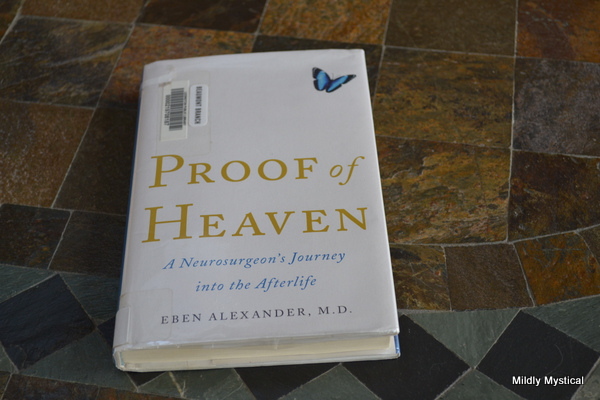A few weeks ago, on the recommendation of friends who found it meaningful, I read Eben Alexander’s Proof of Heaven: A Neurosurgeon’s Journey into the Afterlife. It describes his extended near-death experience, a story he would have viewed with skepticism before slipping into the coma in which his view of reality changed.
Believing that near-death experiences could be explained by certain types of brain activity, Alexander had long dismissed such experiences as hallucinations with no correlation to external reality. But with his rare illness, all activity was shut down in the part of the brain where such stimuli could occur. The kind of brain activity to which Alexander had attributed classic near-death experiences was simply not possible in his brain during this time.
I don’t share the skeptical view of the soul held by Alexander before his experience, but I would not have picked up this book without my friends insisting it was worthwhile. I’m glad they convinced me. I won’t try to describe the experiences he relates, but his compelling story has remained with me since I finished reading it. One aspect to which I keep returning has to do with prayer.
During his sojourn, the time came when he could no longer gain access to the divine realm. Alexander found himself sent back, descending into a physical world that he did not remember. But he was drawn to his destination in this life by faces and voices that emerged from the chaos and became clear to him. Later he realized that those whom he saw and heard were the loved ones gathered in a circle around his hospital bed, praying for him. The single additional person he saw was the minister’s wife, who was not at his bedside but prayed for him at home. He became aware of a young boy pleading fervently for his life, then realized with a shock that it was his young son. At that point, remembering his life on earth and people he loved, he re-entered the physical world. The prayers of others had oriented him as he moved between realms and led him back to his life.
It’s not hard to see the value of prayer in terms of naming our concerns and laying down our burdens. We draw strength from our sense of connection with others, and prayer brings us closer to God and to those for whom we pray. The affirmation of being heard helps empower us to cope with difficulties. Prayer also focuses our attention, helping us to recognize guidance from the divine. But to speculate about where our prayers go, or what it means that God hears our prayers, or how prayers work, is more difficult. How can we speak about any realm but this one, or any reality beyond our personal experience of prayer?
I had Alexander’s story on my mind when I learned that someone I care about had a sudden, debilitating stroke. His condition sounded dire. I was afraid for him and his family. I didn’t know what to ask for. But I prayed. I prayed for health and healing. I prayed for strength—for him and for his family. I thought about all of them continually. And I kept praying, as did his large family, a network of friends, and his church. Within a few days he came back in a way that seems miraculous, with a determined effort in physical therapy that allowed him to go home far sooner and in better shape than anyone could have hoped for.
What allowed this to happen? Did all of those fervent prayers change his outcome? Could they have affected his ability to recover? It’s impossible to know for sure, but it looks that way to me. The prayers didn’t make things smooth or easy, but in a time of extreme crisis they seem to have made a difference.
Yet on the dark side of answered prayers are those that seem to go unanswered, pleas for health and healing that do not come to fruition. Why would God intervene for some requests and not for others?
I have no good answer to that question. But the fact that miracles don’t occur every time doesn’t mean they never do. The world is more than we can fathom. And the messages all around seem to keep urging that we pray.


Susan,
Thank you for the beautiful post. I find so much meaning and hope in your thoughts about the usefulness of prayer, especially in terms of the benefit for the one praying. I agree that sometimes miracles seem to result, and other times we are left angrily pondering why some bad thing could be allowed to happen. Maybe focusing on the fact that our prayers and good intentions help, rather than asking how or why or to what extent, is the point I need to remember.
Love,
Regi
I love this post. A wonderful balanced view that flows from a place of faith that says, “Just because I don’t fully understand the efficacy of prayer, doesn’t negate some of its realities.” Thank you.
Regi, I like what you say about focusing on the fact that our prayers help, and not getting caught in feeling like there’s more we should understand. Now we see through a glass darkly, but perhaps someday we Will understand. It’s so good to know that this piece is meaningful for you, and I appreciate your kind words. Thank you.
It’s great to hear from you, John! It’s true that we don’t have to understand in order to recognize that prayer works. I appreciate your comment.